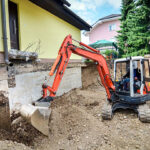An excavating contractor plays a vital role in laying the groundwork for any construction or development project.
They handle the dirt work, including clearing land, digging foundations, grading soil, and removing unwanted debris.
These professionals use heavy equipment like backhoes, bulldozers, and trenchers to reshape land and prepare it properly.
A skilled excavator ensures that the land is safe, level, and ready for further construction tasks.
What Does an Excavating Contractor Do?
The main job of an excavating contractor is to move earth for construction or landscaping purposes.
They work on both residential and commercial projects, helping prepare sites for building, utility lines, and drainage.
Some contractors specialize in areas like demolition, septic tank installation, or road and driveway construction.
Their tasks require careful planning, precision, and compliance with safety regulations and environmental standards.
Equipment Used by Excavating Contractors
Excavating contractors rely on powerful machines to perform tasks efficiently and meet project deadlines.
Common equipment includes excavators, skid-steer loaders, dump trucks, trenchers, and compactors for different terrain conditions.
Each machine is designed to perform specific functions like digging, hauling, compacting, or leveling the ground.
Modern contractors also use GPS technology for accurate excavation and efficient use of time and resources.
Importance of Hiring a Professional Excavating Contractor
Hiring a professional excavating contractor ensures your site is properly prepared without causing environmental or structural issues.
They understand soil types, drainage systems, and legal permits required to carry out excavation projects safely.
Mistakes during excavation can cause costly delays, water problems, or structural instability in future construction phases.
A qualified contractor reduces these risks and increases the project’s chance of long-term success and durability.
Excavation Process Step by Step
The excavation process starts with surveying the land and identifying underground utilities and potential hazards.
Next, the site is cleared of vegetation, debris, and any obstacles that hinder construction work from progressing smoothly.
Then, the contractor begins digging, grading, or trenching according to the blueprint and construction specifications provided.
Finally, the excavated area is inspected and approved before builders continue with concrete foundations or utility installations.
Residential Excavation Services
Residential excavating contractors typically handle tasks like digging basements, creating driveways, and installing septic systems.
They work with homeowners, builders, and landscapers to reshape the land according to design and safety standards.
Proper drainage and grading are essential to prevent water damage and ensure structural integrity of the home.
These professionals also help remove tree stumps, old structures, and rocks that can delay the construction process.
Commercial Excavation Projects
Commercial excavation projects are larger in scope and require more equipment, manpower, and strategic planning.
They involve preparing land for malls, office buildings, parking lots, factories, or large-scale utility systems.
Contractors must coordinate with engineers, architects, and project managers to meet strict deadlines and budgets.
Their experience in handling complex projects makes them valuable partners in the commercial construction industry.
Safety Measures in Excavation Work
Safety is a top priority in excavation because it involves working around heavy equipment and unstable ground.
Contractors must follow OSHA guidelines, use protective gear, and secure the site with proper signage and fencing.
Regular inspections, equipment maintenance, and training help reduce accidents and ensure a safe working environment.
Trench collapses, equipment malfunctions, or utility strikes are serious risks if safety protocols are not followed.
How to Choose the Right Excavating Contractor
Choosing the right excavating contractor involves checking their licenses, insurance, experience, and past project references.
Read online reviews, ask for quotes, and ensure they understand the specific requirements of your construction project.
A reliable contractor communicates clearly, provides detailed plans, and sticks to agreed timelines and budget estimates.
Look for a contractor who values transparency, offers warranties, and is committed to delivering quality work.
Cost of Excavation Services
Excavation costs vary based on project size, location, soil type, and the equipment needed for completion.
Contractors usually charge hourly rates, flat fees, or per cubic yard depending on the job scope and complexity.
Additional costs may include permits, disposal of materials, fuel, and hiring subcontractors for specialized tasks.
Getting multiple quotes and comparing services can help you find a fair and competitive price for excavation work.
Environmental Considerations
Responsible excavating contractors consider the environmental impact of their work and follow eco-friendly practices.
They manage erosion, minimize runoff, and avoid disturbing nearby water sources or protected areas during excavation.
Some use biodegradable hydraulic fluids, dust control measures, and noise reduction strategies to lessen their impact.
Choosing an environmentally conscious contractor helps protect nature while completing your construction goals efficiently.
Conclusion: The Backbone of Construction Projects
An excavating contractor lays the foundation—literally—for everything else that follows in a construction project.
Their skills, equipment, and planning are essential for success, whether for a house, commercial building, or road.
Hiring an experienced, licensed contractor can save time, money, and ensure long-term safety and quality.
Always do your research and work with trusted professionals to make your construction journey smooth and successful.

